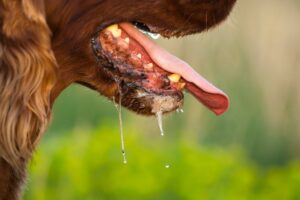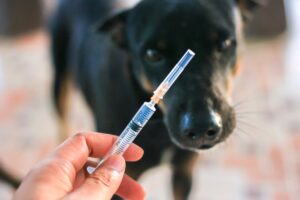As pet owners, the health and safety of our furry companions is always a top priority. Living close to nature—while beneficial in many ways—exposes our pets to potential dangers, including the risk of rabies. Rabies is a deadly virus that can infect both humans and animals, causing severe consequences if left untreated. The good news is that rabies is completely preventable with proper care, vaccinations, and vigilance. By understanding the nature of this disease and taking the right precautions, you can help protect your pet and your entire family.
Rabies is most commonly transmitted through a bite from an infected animal. Wild animals such as bats, raccoons, foxes, and skunks are frequent carriers of the virus and can pass it onto domestic pets or humans. It causes severe behavioral changes and inevitably leads to death in unvaccinated animals. Understanding how rabies works, what symptoms to look for, and how to prevent it can save lives. Let’s explore the details of this deadly virus, symptoms to be aware of, and steps to protect your pets.
What Is Rabies and How Does It Spread?
 Rabies is a viral disease that affects the central nervous system, targeting the brain and spinal cord. It is primarily spread through the saliva of an infected animal, typically via bites. However, the virus can also enter through open wounds or mucous membranes, such as the eyes, nose, or mouth, if exposed to infected saliva.
Rabies is a viral disease that affects the central nervous system, targeting the brain and spinal cord. It is primarily spread through the saliva of an infected animal, typically via bites. However, the virus can also enter through open wounds or mucous membranes, such as the eyes, nose, or mouth, if exposed to infected saliva.
The rabies virus is particularly dangerous because once symptoms appear, it is almost always fatal. Wild animals often serve as reservoirs for rabies, with infected animals displaying uncharacteristic behavior that deviates from their natural instincts. For example:
- Typically shy or nocturnal animals may become aggressive and active during the day.
- Docile creatures may turn vicious and unafraid of humans or other animals.
- Other animals may exhibit odd, erratic behavior such as stumbling or drooling excessively.
Humans, pets, and livestock are all susceptible to the virus if exposed. For these reasons, prevention through vaccination and awareness is crucial.
The Rabies Virus: Infection Cycle and Symptoms
Once the rabies virus infects an animal, it progresses in distinct phases. Understanding these stages can help pet owners notice red flags and take action before it’s too late.
Phase 1: The Virus Takes Hold (Early Symptoms)
- Fatigue and lethargy
- Fever
- Vomiting
- Loss of appetite
At this stage, the infected animal might not display obvious outward signs of rabies. However, these flu-like symptoms indicate that the virus is beginning to spread through the animal’s body.
Phase 2: Behavioral Changes
- Heightened aggression or anxiety
- Nervousness or skittish behavior
- Seeking solitude or acting withdrawn
As the virus affects the brain, the animal’s behavior starts to shift. Even normally friendly animals may grow anxious or unpredictable, while shy animals might lash out aggressively without provocation.
Phase 3: The Furious Stage
 Extreme irritability and aggression
Extreme irritability and aggression- Heightened sensitivity to sound, light, and touch
- Excessive drooling or foaming at the mouth
At this stage, the rabies virus is at its most dangerous. The virus blocks normal brain functions, amplifying the animal’s innate senses and driving it to behave abnormally. Excessive salivation is caused by the inability to swallow, and it is during this phase that the virus is transmitted most commonly through bites.
Phase 4: Death
- Paralysis
- Coma
- Death
Rabies is almost always fatal once symptoms develop. In unvaccinated animals, the virus typically proves fatal after just a few days of displaying symptoms.
Why Vaccination Is Crucial
The best defense against rabies is prevention through vaccination. The rabies vaccine is required by law in many areas because of how serious and widespread the disease can be if left unchecked. Here’s why it’s so important to keep your pet’s vaccination status up to date:
- It saves lives. Vaccinating your dog, cat, or any other susceptible animal protects them from contracting rabies if they’re exposed to an infected animal.
- It protects humans. Dogs and cats play an integral role in preventing the spread of rabies to humans. By vaccinating your pet, you’re creating a safer environment for your entire family.
- It’s legally required. Many jurisdictions mandate rabies vaccinations for pets, and failing to vaccinate your pet could result in fines or other consequences.
- It curbs the spread of the virus. Preventing infections in pets creates a barrier that helps stop rabies outbreaks before they start.
Speak with your veterinarian to ensure your pet’s rabies vaccinations are up to date. Depending on the type of vaccine, your pet may need a booster shot every 1-3 years.
Protecting Your Pets: Preventative Measures
In addition to staying on top of vaccinations, there are other steps pet owners can take to reduce the risk of exposure to rabies.
Avoid Contact with Wildlife
Keep your pets away from wild animals that could be carriers of rabies. Supervise dogs during walks and keep cats indoors to limit their exposure to wildlife.
Secure Your Home and Yard
Prevent wildlife from entering your property by securing trash bins, sealing crawl spaces, and ensuring fencing is in good repair. Limit food sources that might attract raccoons, skunks, or other wildlife.
Report Suspicious Animal Behavior
If you notice wildlife behaving oddly—such as nocturnal animals out during daylight hours or a normally shy animal acting aggressive—contact local animal control immediately. They can safely handle and remove the animal to prevent the virus from spreading.
Remove Deceased Animals Promptly
The rabies virus can remain active on the carcass of an infected animal, posing a danger to scavengers and potentially pets. Always wear gloves and use proper safety precautions when disposing of dead wildlife, or contact animal control for assistance.
Limit Stray Animal Contact
Avoid interactions with stray or feral animals as they may carry rabies or other communicable diseases. If you feed or care for stray animals, work with local animal shelters or rescue groups to ensure proper vaccinations.
What to Do If You Suspect Rabies
 If you think your pet has been bitten by or exposed to an infected animal, it’s essential to act quickly:
If you think your pet has been bitten by or exposed to an infected animal, it’s essential to act quickly:
- Contact your veterinarian immediately for guidance. They will likely recommend a rabies booster shot if your pet’s vaccination is current or testing if it is not.
- Contain your pet and avoid direct contact with their saliva. If you must handle them, use gloves to protect yourself.
Report the incident to local animal control, especially if wildlife was involved. - For humans, any contact with a rabid animal warrants immediate medical attention. Post-exposure prophylaxis (PEP)—a series of rabies vaccinations—can prevent the virus from taking hold if administered quickly, so act as soon as possible if there has been an exposure.
Schedule Northern Virginia’s Most Trusted Pet Sitters
Rabies is a serious yet entirely preventable threat to both pets and humans. By staying vigilant, keeping your pets vaccinated, and educating yourself about the dangers of rabid animals, you can help protect your furry companions, your family, and your community. Prevention starts with responsible care.
To ensure your pet receives the attention and protection they deserve—even when life keeps you busy—trust Paw Pals, Northern Virginia’s most reliable pet sitting service. Whether you need someone to check in during the day, provide consistent care while you’re away, or offer expert advice on keeping your pet safe, our professional sitters are here to help. Contact us today to schedule your pet sitting services and give your pet the care they deserve!


